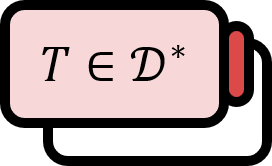Proof That the Space of Test Functions is a Proper Subset of the Schwartz Space
Theorem1
Let $\mathcal{D}$ be the space of test functions, and let $\mathcal{S}$ be the Schwartz space. Then the following equation holds.
$$ \mathcal{D} \subsetneq \mathcal{S} $$
Proof
Strategy: First, we show that all test functions belong to the Schwartz space, and then by providing an example of a Schwartz function that is not a test function, we prove the theorem.
Define $\phi$ as a Schwartz function if it satisfies the following two conditions:
- (a) $\phi \in C^{\infty}$
- (b) For all multi-indices $\alpha$, $\beta$, $\left| x^{\beta}D^{\alpha}\phi (x) \right| <\infty$
Assume an arbitrary test function $\phi$ is given. Since $\phi \in C_{c}^{\infty}$, it satisfies condition (a). The support of $\phi$ is bounded, so there exists $r>0$ satisfying the following equation.
$$ \mathrm{supp}\phi \subset \overline{B}(r) $$
Here, $\overline{B}(r)$ is a closed ball centered at the origin with radius $r$. Moreover, due to the properties of test functions, for any multi-index $\alpha$, the following holds true.
$$ \mathrm{supp}D^{\alpha}\phi\subset \mathrm{supp}\phi \subset \overline{B}(r) $$
Now, let’s consider two different cases.
Case 1. $x \notin \overline{B}(r)$
Then, $D^{\alpha}\phi (x)=0$ and
$$ \left| x^{\beta}D^{\alpha}\phi (x) \right|=0 <\infty $$
Case 2. $x \in \overline{B}(r)$
$D^{\alpha}\phi (x)$ is a continuous function and, since continuous functions have both maximum and minimum values on compact spaces, there exists some positive number $K>0$ for which the following equation holds.
$$ \left| x^{\beta}D^{\alpha}\phi (x) \right|\le r^{\beta}K <\infty $$
Therefore, because $\phi \in \mathcal{S}$, it follows that $\mathcal{D}\subseteq \mathcal{S}$ holds. Now, consider the following function.
$$ \phi (x)=e^{-x^{2}} $$
Then, it is evident that $\phi \in C^{\infty}$ holds. However, since $\phi (x)\ne0, \forall x\in \mathbb{R}$, $\phi$ does not have a compact support. Hence, $\phi$ is not a test function. Now, showing $\phi \in \mathcal{S}$ completes the proof. By the chain rule, $D^{\alpha}\phi$ can be expressed as the product of $\phi$ and any polynomial $P$.
$$ D^{\alpha}\phi (x) = P(x)\phi (x) $$
Therefore, the following equation holds.
$$ \begin{equation} \left| x^{\beta}D^{\alpha}\phi (x) \right| =\frac{\left| x^{\beta}P(x) \right| }{e^{x^{2}}} \label{eq1} \end{equation} $$
Since the numerator is a polynomial and the denominator is an exponential function, the following equation holds.
$$ \lim \limits_{x\to \pm\infty} \frac{\left| x^{\beta}P(x) \right| }{e^{x^{2}}}=0 $$
Therefore, for all $\varepsilon >0$, there exists $N>0$ such that the following equation holds.
$$ \left| x \right| > N \implies \frac{\left| x^{\beta}P(x) \right| }{e^{x^{2}}} < \varepsilon $$
Now, consider when $\left| x \right| \le N$. $[-N,N]$ is compact and $\eqref{eq1}$ is a continuous function, so it is bounded by some positive number $M>0$. Now, let $C_{\alpha,\beta}=\max \left\{ M,\varepsilon \right\}$, and then the following holds.
$$ \left| x^{\beta}D^{\alpha}\phi (x) \right| \le C_{\alpha,\beta} $$
Therefore, $\phi \in \mathcal{S}$ holds. Hence, $\phi \notin \mathcal{D}$ holds and because $\phi \in \mathcal{S}$ holds, the following statement is true.
$$ \mathcal{D} \subsetneq \mathcal{S} $$
■
Daniel Eceizabarrena perez, Distribution Theory and Fundamental Solutions of Differential Operators (2015), p16-17 ↩︎
